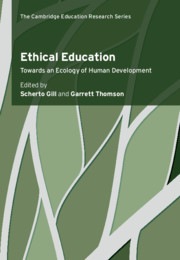Book contents
- Ethical Education
- Ethical Education
- Copyright page
- Contents
- Contributors
- General Introduction
- Part I Theoretical Perspectives on Ethical Education
- Introduction to Part I
- 1 Ethics in Education
- 2 Ethical Relationships in Schools
- 3 Towards an Ethical Understanding of Others
- Conclusion to Part I
- Part II Pedagogical Approaches to Ethical Education
- Part III Ethical Education in Practices
- Notes
- Bibliography
- Index
Conclusion to Part I
from Part I - Theoretical Perspectives on Ethical Education
Published online by Cambridge University Press: 30 June 2020
- Ethical Education
- Ethical Education
- Copyright page
- Contents
- Contributors
- General Introduction
- Part I Theoretical Perspectives on Ethical Education
- Introduction to Part I
- 1 Ethics in Education
- 2 Ethical Relationships in Schools
- 3 Towards an Ethical Understanding of Others
- Conclusion to Part I
- Part II Pedagogical Approaches to Ethical Education
- Part III Ethical Education in Practices
- Notes
- Bibliography
- Index
Summary
This first part of the book has indicated why it is not enough for ethics to be defined in terms of an individual person’s character traits, as many writings in the Aristotelian tradition tend to do (Steutel and Carr, 1999). Aristotle’s ethical theory amounts to the claim that virtues are character traits, the exercise of which forms part of a flourishing life for a person defined in terms of the development of the person’s essential nature. In short, the starting point of a typical Aristotelian theory is the individual person, her flourishing, and her activities rather than the social relations that enable them. This implies that the primary ethical concern is me: How can I become more virtuous? This indicates that, in this tradition, relationships themselves are of derivative ethical concern.
- Type
- Chapter
- Information
- Ethical EducationTowards an Ecology of Human Development, pp. 59 - 60Publisher: Cambridge University PressPrint publication year: 2020

